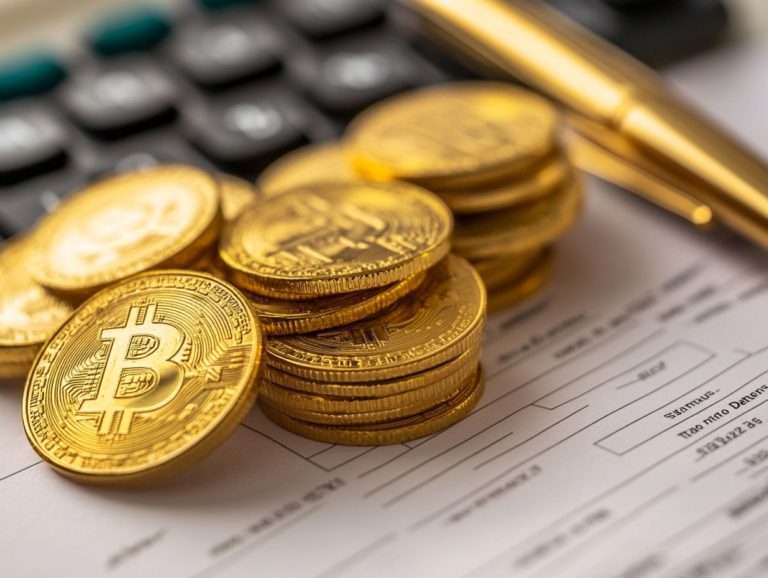How to Stay Informed About Precious Metals Tax Changes
Navigating the landscape of precious metals investments can be intricate, particularly in light of recent tax law changes.
Grasping these shifts is essential, as they can profoundly influence your financial strategy and investment returns.
This article delves into the fundamentals of precious metals tax laws, emphasizing the importance of staying informed and effectively interpreting and responding to these changes.
With insights on trustworthy sources, professional guidance, and compliance measures, you will be thoroughly prepared to protect your investments.
Contents
- Key Takeaways:
- Understanding Precious Metals Tax Changes
- Why Stay Informed About Tax Changes?
- Sources for Staying Informed
- How to Interpret Tax Changes
- Taking Action to Stay Compliant
- Frequently Asked Questions
- What are precious metals tax changes and why should I stay informed about them?
- How can I stay informed about precious metals tax changes?
- Are precious metals tax changes frequent?
- Do tax changes for precious metals only affect investors?
- How can I adjust my investment strategy in response to tax changes for precious metals?
- Do I need to pay any taxes on my precious metal holdings?
Key Takeaways:

- Stay informed about precious metals tax changes to protect your investments.
- Regularly check credible sources for updates and consult tax professionals.
- Take proactive steps to ensure compliance and optimize your investment strategy.
Understanding Precious Metals Tax Changes
Grasping the recent tax changes concerning precious metals, such as gold and silver, is essential for investors aiming to successfully navigate the intricate landscape of tax implications.
The IRS has revised tax laws that directly affect precious metal investments, focusing particularly on capital gains tax and collectibles tax. For dealers, understanding tax compliance for precious metals dealers is crucial.
These updates carry substantial consequences for taxpayers. They are especially important for those involved in estate planning or utilizing tax-advantaged accounts. By staying informed about the latest IRS guidelines, you empower yourself to make well-informed decisions regarding your portfolio and ensure compliance with the ever-evolving reporting requirements.
Overview of Tax Laws for Precious Metals
An overview of tax laws for precious metals reveals a framework that dictates how your investments in gold, silver, and other precious metals are taxed. This primarily occurs through capital gains tax obligations established by the IRS.
This framework is particularly crucial for you as an investor, highlighting the stark differences between your metal investments and traditional stock or bond investments.
Unlike stocks, where the long-term capital gains tax is generally more favorable, precious metals can hit you with a higher collectibles tax rate of 28% on gains for assets held over a year.
Navigating the reporting requirements can be quite intricate. You ll need to deal with specific forms and declarations, making the guidance of tax professionals invaluable. These experts are essential in ensuring your compliance and optimizing tax strategies as you engage with this unique asset class.
Why Stay Informed About Tax Changes?
Staying informed about tax changes is essential for you as an investor in precious metals. It directly impacts your investment strategies and overall financial well-being.
With the IRS constantly updating tax laws, grasping your tax obligations and capital gains tax becomes crucial. This knowledge helps you sidestep potential financial penalties and take full advantage of tax-efficient strategies.
Impact on Investments and Finances
Tax changes can significantly impact your investments. This is especially true when navigating capital gains tax and obligations tied to precious metal assets.
These alterations in tax legislation can send ripples through your financial planning, influencing your decisions around asset allocation and portfolio management.
You need to consider how new tax brackets or deductions will affect your expected returns and future earnings.
Understanding the nuances of tax-efficient strategies like utilizing tax-advantaged accounts or opting for long-term holdings to benefit from reduced tax rates can be essential. By remaining proactive, you can effectively minimize capital gains tax while maximizing overall investment growth, ensuring your financial strategies align not just with market performance but also with the ever-evolving landscape of tax regulations.
Sources for Staying Informed

To stay informed about tax changes, turn to reliable sources such as government websites, IRS guidelines, and respected industry publications. These resources offer essential updates on your tax obligations regarding precious metals, ensuring you remain well-informed and compliant.
Government Websites and Publications
Government websites, especially those managed by the IRS, are invaluable resources brimming with information on tax laws, reporting requirements, and the latest updates concerning taxation on precious metals.
To navigate these essential resources effectively, concentrate on sections dedicated to capital gains, collectibles, and the specific guidelines regarding the sale or exchange of precious metals like gold and silver. Familiarize yourself with IRS publications, as these documents provide clarity on the ever-evolving landscape of tax obligations, including the tax impact of precious metals in your financial plan, and help ensure your reporting is accurate.
Review these publications regularly to stay updated on legislative changes while minimizing the risk of costly errors on your tax returns. By grasping these concepts, you can approach tax season with confidence, ensuring that all necessary compliance measures are firmly in place.
Industry News and Updates
Staying informed about industry news and updates is essential for investors in precious metals since these factors can significantly impact tax changes and investment strategies.
By monitoring market trends and regulatory changes, you can make informed decisions that align with your financial aspirations. Key resources to consider include reputable publications like the Wall Street Journal and Bloomberg, which offer insightful analyses. Additionally, understanding the impact of tax policy changes on precious metals can further guide your investment strategies. Specialized blogs such as Gold Seek and Silver News are also beneficial.
Online forums like Kitco and the r/preciousmetals subreddit provide excellent platforms for real-time discussions and advice from fellow investors. Engaging with these sources not only helps you grasp market dynamics but also assists in navigating the often-complex tax regulations for precious metals tied to precious metal investments.
How to Interpret Tax Changes
Interpreting tax changes can often feel like navigating a labyrinth, but enlisting the expertise of a tax professional can illuminate the path. They can offer valuable insights into how the latest IRS guidelines regarding capital gains tax profits from selling assets like precious metals for more than you paid and estate planning may influence your precious metal investments.
Consulting with Tax Professionals
Talking to a tax professional is a vital step for any investor. They can help you understand complex tax implications and create effective strategies.
These experts help you maintain precise record-keeping, which is essential for maximizing deductions (reductions in taxable income) and credits (amounts that reduce your tax bill); they also offer customized tax planning strategies that align perfectly with your individual financial goals.
By skillfully navigating the often complex IRS regulations, they save you time, ease the stress of compliance, and ultimately help you avoid costly mistakes or audits.
Their insights empower you to make informed decisions about buying, selling, or holding assets, significantly enhancing the overall financial performance of your investment portfolio.
Understanding the Fine Print

Understanding the fine print in tax laws is crucial for you as an investor. It ensures you follow the rules set by the IRS and helps you avoid unexpected tax obligations, especially regarding capital gains tax.
Navigating these complex details is about more than just avoiding trouble; it’s about making informed decisions that can significantly influence your investment returns. For example, you might think that all precious metals are taxed uniformly, but that’s a common misconception. Understanding tax brackets for precious metals investors is crucial, as gold and silver bullion come with distinct tax implications compared to collectibles, like certain coins or ingots, which may face higher capital gains tax rates.
Failing to report a sale accurately or misunderstanding the holding period can leave you vulnerable to audit risks or penalties. By thoroughly examining these complex details, you can effectively sidestep common pitfalls and uphold your financial integrity.
Taking Action to Stay Compliant
As a precious metal investor, it’s crucial for you to take proactive steps to meet your tax obligations. This ensures you meet IRS requirements while optimizing your tax planning and maintaining meticulous records.
Steps to Take for Compliance
You can take several steps to ensure your compliance with tax obligations. Start with a solid understanding of IRS reporting requirements and craft effective investment strategies for precious metals.
It’s smart to consult with a tax professional who is well-versed in current regulations. They can provide critical insights tailored to your financial situation, ensuring you’re on the right track.
Maintaining accurate records of all your transactions, purchases, and sales is essential. This documentation will not only substantiate your claims but also simplify your reporting process.
Stay alert! By keeping up with ongoing changes in tax laws and regulations, you empower yourself to adjust your strategies. This proactive approach leads to more informed decision-making and better compliance.
Frequently Asked Questions
What are precious metals tax changes and why should I stay informed about them?
Precious metals tax changes refer to any updates or modifications to the tax laws and regulations surrounding precious metals such as gold, silver, and platinum. Staying informed about these changes is important because they can significantly impact the taxes you owe on your investments.
How can I stay informed about precious metals tax changes?

One way to stay informed is by regularly checking the website of the government agency responsible for regulating precious metals, like the Internal Revenue Service (IRS) in the United States. You can also sign up for email alerts or follow trusted financial news sources for updates on tax changes.
Are precious metals tax changes frequent?
Precious metals tax changes can occur at any time, depending on various factors such as policy changes, economic conditions, and global events. It’s crucial to stay informed and regularly monitor any potential changes that may affect your investments.
Do tax changes for precious metals only affect investors?
No, tax changes for precious metals can also impact businesses that deal with these commodities. For example, if you own a precious metals dealership, you need to be aware of any tax changes that may affect your pricing or profitability.
How can I adjust my investment strategy in response to tax changes for precious metals?
In response to tax changes, you may need to reassess your investment strategy and make adjustments. It’s advisable to consult with a financial advisor to determine the best course of action for your specific situation.
Do I need to pay any taxes on my precious metal holdings?
It depends on various factors such as the type of precious metal, the amount of your investment, and your country’s tax laws. It’s best to consult with a tax professional for guidance on your specific tax obligations related to precious metals.














